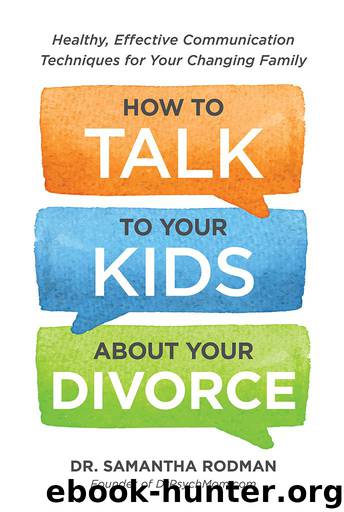How to Talk to Your Kids About Divorce by Samantha Rodman

Author:Samantha Rodman [Rodman, Samantha]
Language: eng
Format: epub
Publisher: Adams Media, Inc.
Mental Illness and Addiction
Mental illness or addiction in one or both partners can often lead to marital conflict and divorce. Both of these issues can manifest themselves in various ways when parenting. Issues can range from a depressed or substance-abusing parent who does not engage much with a child; to a bipolar, borderline, or drug-addicted parent who experiences anger and rage on an unpredictable basis; to a parent that terrifies the family with psychotic breaks and delusions.
Whether you or your co-parent is the one with mental illness, you have likely experienced a great deal of shame over either having a mental disorder or exposing your child to this behavior in a co-parent. It’s also likely that your child saw arguments over the substance abuse or mental illness issue, and exposing kids to marital conflict can be another source of shame for parents. This shame, if not processed, can lead to lasting anger and depression.
If it’s your co-parent that suffers with untreated mental illness, you may be trying to get sole custody so that your child is not affected by your co-parent’s erratic behavior. This can be another tremendous stressor. If the parent with these conditions is you, you need to find help as quickly as possibly, for your own sake and that of your children. Both medication and talk therapy together lead to the best outcomes for mental illness, and often talk therapy, medication, group meetings can work most effectively to help people with addictive behaviors, such as alcoholism and drug use. In fact, even if it’s your co-parent who suffers from mental illness or addiction, it would be a good idea to seek counseling for yourself, to understand how to avoid getting into a dynamic like this with another disordered partner in the future.
No matter how unpredictable, volatile, or scary your or your co-parent’s behavior has been in the past, every day is a new day and children forgive quickly. Younger children in particular are very forgiving and highly motivated to continue loving a parent even in the face of the most horrific or scary behavior. This is why it’s essential not to demonize a co-parent with mental illness or one who struggles with addiction. And if the parent is you, do not engage in self-pity in front of your child, saying that you are a terrible person.
The most important thing to do as a parent in this situation is to be open and honest with your child at an appropriate developmental level. This can counteract the toxic shame that children from highly dysfunctional households experience on a daily basis. In homes where one or both co-parents suffer from mental illness or addiction, children learn, “Don’t tell anyone what goes on in this house,” whether this is stated explicitly or implicitly. This atmosphere of shame and secrecy is very toxic for children, and can be equally as psychologically damaging as any conflict or erratic behavior that has been witnessed.
Start being honest and direct about what you or your co-parent have been experiencing.
Download
This site does not store any files on its server. We only index and link to content provided by other sites. Please contact the content providers to delete copyright contents if any and email us, we'll remove relevant links or contents immediately.
Should I Stay or Should I Go? by Ramani Durvasula(7652)
The Lost Art of Listening by Michael P. Nichols(7492)
The Rosie Project by Graeme Simsion(6377)
Beartown by Fredrik Backman(5737)
We Need to Talk by Celeste Headlee(5608)
Ego Is the Enemy by Ryan Holiday(5413)
Hunger by Roxane Gay(4922)
Suicide Notes by Michael Thomas Ford(4821)
I Love You But I Don't Trust You by Mira Kirshenbaum(3859)
Mummy Knew by Lisa James(3686)
Not a Diet Book by James Smith(3410)
Crazy Is My Superpower by A.J. Mendez Brooks(3398)
Toxic Parents by Susan Forward(3283)
Girl, Wash Your Face by Rachel Hollis(3282)
The Complete Idiot's Guide to Coping With Difficult People by Arlene Uhl(3145)
The Social Psychology of Inequality by Unknown(3018)
Name Book, The: Over 10,000 Names--Their Meanings, Origins, and Spiritual Significance by Astoria Dorothy(2978)
The Hard Questions by Susan Piver(2967)
The Gaslight Effect by Dr. Robin Stern(2791)
